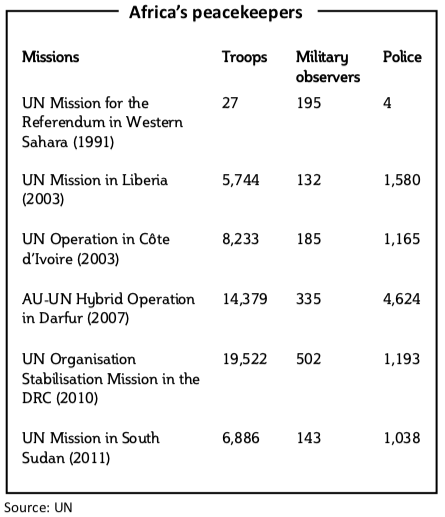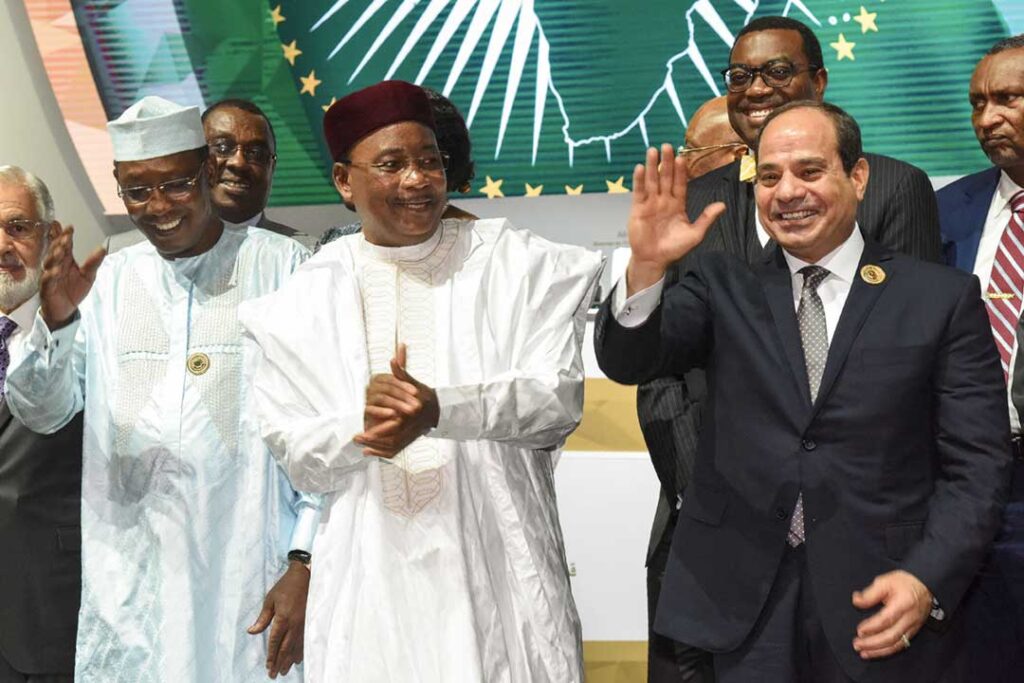African Union: diplomatic failures
Supranational African organisations have failed to resolve violent conflicts without Western help
Conflicts in the Democratic Republic of Congo (DRC), Mali, Somalia and South Sudan highlight the impotence of international and regional organisations to quell violent crises on the continent.
Skirmishes are still erupting in the DRC and Somalia. In South Sudan a civil war that reached a ceasefire in January has erupted once again. Despite elections in Mali held in July 2013, sporadic clashes continue in the west African Sahel.
These ongoing battles underline the failure of the African Union (AU) and in Mali’s case, the Economic Community of West African States (ECOWAS), to play a role beyond diplomatic engagement and providing African soldiers for the front line. In Mali, the West ultimately pulled the strings. The initial African response to Mali’s crisis, and the more decisive French intervention that followed, illustrate the current limitations of supra-national African organisations.
Mali’s troubles surfaced in early 2012 when the National Movement for the Liberation of Azawad (MNLA) rebelled against the Malian president, Amadou Toumani Touré, attacking army posts in the north and taking the town of Aguelhok. In March Malian soldiers—embarrassed by their defeat in suppressing this rebellion and angry at the political class for not supporting these efforts— staged a mutiny in the capital, Bamako, which erupted into a full-blown coup.

ECOWAS responded quickly. Their diplomats urged the military junta to return the elected government to power. Neighbouring ECO- WAS member states—Burkina Faso, Guinea, Niger and Senegal—closed their borders, blocking Mali’s access to the sea. Talks led by the president of Burkina Faso, Blaise Compaoré, paved the way to an agreement, which put in place a civilian government until elections were held.
Though the ECOWAS response was swift, it was limited. The coup created a political vacuum in Bamako, which delayed suppressing the north’s rebellion. ECOWAS’s proposal for a military mission—MICEMA (ECOWAS Mission in Mali)—was roundly unpopular with the military junta and key neighbours, Algeria and Mauritania. Islamists from the two countries were alleged to have played a part in the Mali uprising and Algeria and Mauritania feared “a blowback from an ECOWAS intervention in the form of returning extremists”, argued Wolfram Lacher, a security analyst at the German Institute for International and Security Affairs in an article in Stability, a policy journal. “Algeria was also opposed to a French military presence in what it considers its strategic backyard,” he wrote in the 2013 piece. Sceptical Western donors declined to fund MICEMA because they doubted ECOWAS troops could fight effectively in desert conditions.
As ECOWAS’s efforts stalled, the AU stepped in. It appeased the junta by giving the Malian army the lead in the planned military operation in the north, according to Lori-Anne Théroux-Bénoni, a senior researcher at the Institute for Security Studies in Dakar, Senegal. As a concession to placate Algeria, the AU transformed MICEMA into the African-led International Support Mission in Mali (AFISMA), making it a pan-African rather than a west African initiative.
By September 2012 Islamist militants had hijacked the MNLA’s rebellion and were imposing sharia law, with public beatings and amputations. The UN Security Council authorised the AU to deploy AFISMA, but lent little financial or logistical sup- port. This left the AU and ECOWAS hamstrung with a mission that neither could afford.
Ultimately when some 1,200 extremist militants launched an offensive on January 10th 2013 threatening Bamako, the international community responded. France launched Operation Serval the next day and flew in 4,000 troops and a sophisticated arsenal. With the aid of 2,000 Chadian soldiers, it rapidly retook northern Mali from the extremist groups, who scattered into the nearby desert and hills.
AFISMA’s first contingents went into action a week later. By July 2013 France had secured one of the fastest AU-to-UN handovers the continent has seen: AFISMA was re-hatted as the United Nations Multidimensional Integrated Stabilisation Mission in Mali (MINUSMA).
This transfer effectively sidelined ECOWAS and the AU. While their early engagement played an important role in the diplomatic response to the conflict, in the end they were left with little prospect to effectively influence the future course of the multilateral response.
A concrete military response to the Mali crisis emerged only when the West stepped in and provided financial and logistical support. For France, the intervention’s main backer, the insurrection was not simply “an African problem”. The fall of northern Mali to an al-Qaeda-linked group raised the spectre of the Sahel becoming a haven for anti-Western militant groups, criminal networks and kidnapping. They feared this would mushroom from a direct threat to local European business interests into a global terrorist menace. Without the initial French military intervention and subsequent lobbying, the UN was unlikely to have taken the reins for running the mission, and the AU would have been unable to cover its running costs.
The protection of Malians in the north was repeatedly invoked as a justification for the international intervention. Attention remained fixed on restoring security, however, and the population’s fundamental problems—unemployment and poverty—took a backseat. The conflict exacerbated pre-existing food insecurity across Mali, disrupted markets and kept aid agencies far from the battle-scarred north.
Refugees streamed out of northern Mali and settled on the borders of Burkina Faso, Mauritania and Niger, frontiers of desperate destitution where the locals were still reeling from the previous year’s food crisis. In some places refugees outnumbered the host citizens. Water and basic services were scarce.
ECOWAS and the AU have human rights and humanitarian assistance policies and plans to expand these activities, but on paper only. The AU has few skills and resources to enforce its policy on internal displacement. ECOWAS also has a mixed record. When the ECOWAS Monitoring Group (ECOMOG) deployed to Liberia in 1990, it was mocked for its corruption and looting and nicknamed “Every Car and Movable Object Gone”. Fear of an ECOWAS intervention was at least one of the threats that drove refugees over Mali’s borders before the French arrived, said Jeremy Swift, an anthropologist who has worked with the British government.
The UN and NGOs—not ECOWAS and the AU—provided food and helped set up and run refugee camps. But ongoing insecurity and insufficient funding has pre- vented UN agencies and humanitarian NGOs from helping further.
Political negotiations between armed Islamist groups and the Malian government continue, but refugees remain unconvinced that peace will last. Most of those who fled during the recent crisis, now two years old, have not returned to their homes.
France was narrowly focused on countering terrorism and succeeded in driving the extremist militants deeper into the Sahel and neighbouring countries. Northern Mali, however, remains susceptible to a relapse in conflict as long as poverty and corruption persist and lax border controls allow armed groups to infiltrate. Yet neither the AU nor ECOWAS has made concerted attempts to address the conflict’s core causes.
The AU and its sub-regional organisations still have far to go before they can claim independence from a Western agenda and align their contribution to what Africans need. Their military missions would be more effective and enduring if they gave careful consideration to long-term objectives and the drivers of conflict. Their severely limited skills and resources suggest that expanding into new areas, such as providing food assistance, may be a bridge too far, but refugee crises and harmonising responses to cross-border security threats would profit from greater regional coordination.



